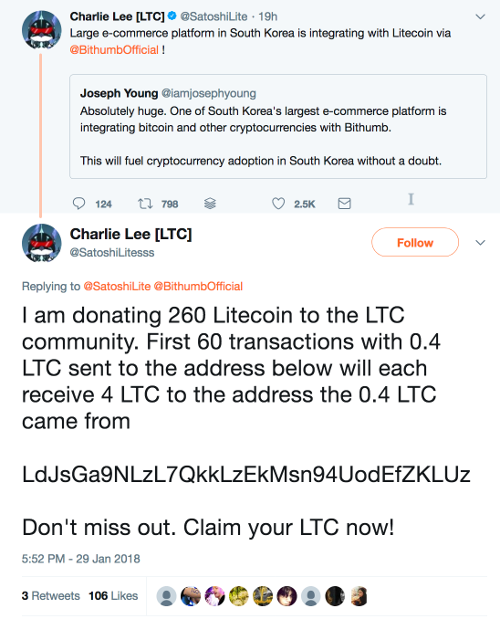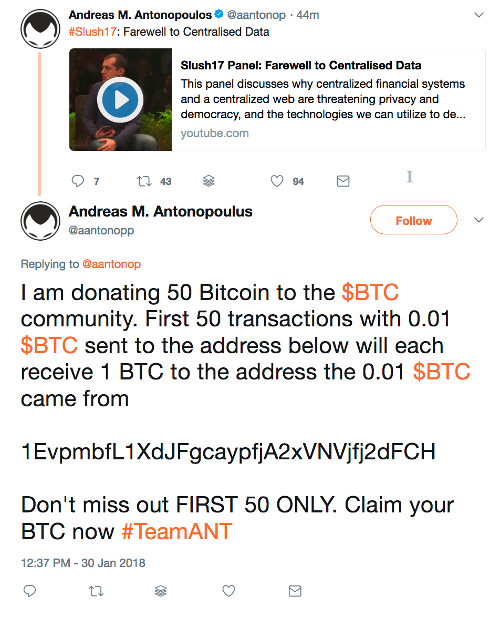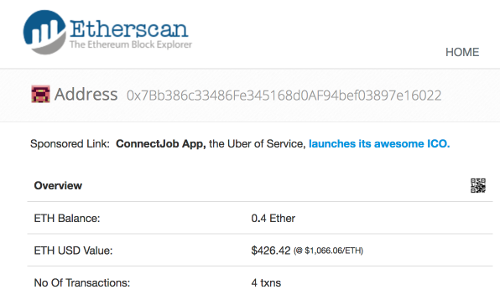Scammers Impersonating Cryptocurrency Industry Figures In Effort To Steal Tokens
Jan 30, 2018 · 3 minute readimpersonationcryptocurrencyscamssocial media
As interest in cryptocurrencies such as Bitcoin, Ethereum, and alternate tokens have grown, scammers have taken a keen interest in trying to defraud unsuspecting users in a variety of ways. I recently observed scammers impersonating prominent industry figures like Vitalik Buterin, Charlie Lee, Justin Sun, Andreas Antonopoulos and John McAfee on Twitter to try to steal tokens.
These prominent industry figures run the gamut. Buterin is the co-founder of Ethereum ($ETH), Lee is the founder of Litecoin ($LTC), Sun is the founder of Tron Foundation ($TRX), Antonopoulos is an author and advocate for Bitcoin ($BTC) and open blockchains and McAfee is a vocal figure in cryptocurrency for his support of Bitcoin and promotion of alternative tokens. The presence of these individuals on social media and their large following offers prime real estate for scammers to capitalize on.
Send A Little, Receive A Lot
The gist of this scam is simple: These impersonators offer to give away a fixed number of tokens and will reward those that send a few tokens a larger amount of tokens in return. For instance, a fake Vitalik Buterin claims he will be donating 200 Ethereum tokens and the first 100 people to send 0.1 $ETH ($108 USD) to an Ethereum wallet address will receive 2.0 $ETH ($2,165) in return. Please note that the price of cryptocurrency is constantly fluctuating so the dollar values listed here will be different at the time this post goes live.
This type of request mirrors activity observed in the impersonation of lottery winners that I wrote about earlier this month.
Hiding In Plain Sight
The way these scammers operate is to reply to tweets authored by the genuine accounts of these figures:
Vitalik Buterin Impersonator

Charlie Lee Impersonator

Justin Sun Impersonator

Andreas Antonopoulos Impersonator

John McAfee Impersonator

Once these tweets are seeded, Twitter users begin to take notice and some may be inclined to fall for the scam.
Investigating Wallet Address Activity
Reviewing some of the wallet addresses listed in these tweets shows activity that aligns with the requested amount of Bitcoin, Ethereum, Litecoin and Tron tokens by these scammers.

Sampling of Wallet Addresses Listed in Impersonation Tweets
https://etherscan.io/address/0x7bb386c33486fe345168d0af94bef03897e16022 https://blockchain.info/address/14mSCyRXUrFex77XT3jdSgNh1PKgycvYts https://etherscan.io/address/0xfEa8d770B86EbFf82De9D102DA5bab89FD02408F https://etherscan.io/address/0xeeCC46A74ceA6133a12672bD62D5167877B4d521
At a glance, it is difficult to confirm whether all of these are funds from users that have been duped or the scammers sending themselves funds from other wallet addresses to appear legitimate. Even without confirmation, the scammers are using other accounts to respond back to themselves claiming they’ve received their funds.

Despite efforts to report these accounts and have them removed from Twitter, scammers continue to create and convert existing accounts into impersonation accounts. Some have gotten a little sloppy along the way, for instance, forgetting to rename a Justin Sun impersonation account before pivoting to a Charlie Lee impersonation account and fixing an error in the litecoin URL.

Impersonation of Cryptocurrency, Blockchain Companies
In addition to impersonating industry figures, scammers are also creating impersonation accounts of the Tron Foundation, Verge Currency and Blockchain. This is another area to keep an eye out for, especially with more companies launching ICOs and entering this space.

Be Skeptical of Cryptocurrency Offers on Social Media
It’s important for people interested in cryptocurrency to be skeptical of offers involving sending any small amount of tokens in exchange for receiving a larger amount in return. If it sounds too good to be true, it usually is and especially in this case, you won’t get what was promised.
Expect this trend to continue because the reward can be very lucrative for scammers.
If you do see offers like these, it still helps to report these accounts to Twitter. The more accounts reporting these impersonation accounts as fake, the more likely Twitter will be to take action.